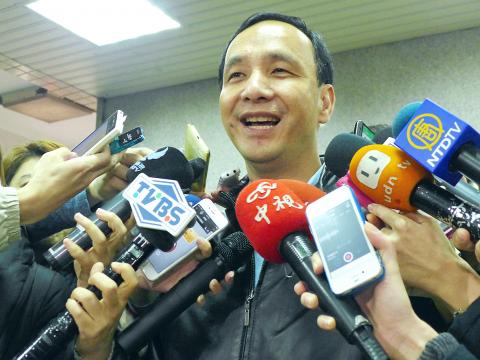The Democratic Progressive Party (DPP) yesterday accused the Chinese Nationalist Party (KMT) of trying to evade legislative oversight of cross-strait affairs following news reports that KMT Chairman and New Taipei City Mayor Eric Chu (朱立倫) is scheduled to meet with Chinese President and Chinese Communist Party (CCP) leader Xi Jinping (習近平) in May or June.
Chu said in Hong Kong on Monday that “it is natural” for the KMT chairman to attend the annual KMT-CCP forum, or the cross-strait economic, trade and culture forum that was launched in 2006 when the DPP was the ruling party.
China’s Taiwan Affairs Office responded quickly, with spokeswoman Fan Liqing (范麗青) saying on Tuesday that Chu was welcome to visit China at his convenience and to “work to promote cross-strait relations and cement the consensus on the ‘1992 consensus’ and the anti-independence stance.”

Photo: Lee Ya-wen, Taipei Times
According to the Chinese-language Apple Daily, which cited an anonymous KMT official in the report published yesterday, Chu has decided to visit China with a group to attend the 10th KMT-CCP forum and meet with Xi, which has received President Ma Ying-jeou’s (馬英九) support.
Mainland Affairs Council (MAC) Minister Andrew Hsia (夏立言) said that the council “would be glad to see” any interaction between the two parties as long as it is advantageous to the mutual understanding of the two sides of the Taiwan Strait.
Meanwhile, the DPP expressed concern that the KMT, as the ruling party, might force the public to accept any deals it struck with Beijing.
DPP caucus convener Tsai Chi-chang (蔡其昌) said that cross-strait negotiations have become “single-track” since the council took over and the Straits Exchange Foundation’s role was diminished. However, Chu is now trying to re-establish a “double-track negotiation system” with the KMT-CCP forum and seize the lead over Ma in cross-strait affairs.
A double-track system would allow negotiations to evade legislative scrutiny, he said.
“The DPP is for cross-strait interactions, but they have to be transparent and monitored,” he said.
“The cause of the Sunflower movement is still vivid in memory. The public will not accept any attempts to force them to swallow agreements borne out of negotiations that they had not sanctioned,” Tsai added.
DPP Legislator Lee Chun-yi (李俊俋) said a Chu-Xi meeting would allow Chu, as KMT chairman, to meet the Chinese president.
“But is the cross-strait relationship a party-to-party one? Is the KMT representative of the Taiwanese people?” Lee asked.
KMT Legislator Wu Yu-jen (吳育仁) said that the DPP could also set up its own forum with the CCP if it is “uncomfortable with the KMT-CCP forum.”

‘FORM OF PROTEST’: The German Institute Taipei said it was ‘shocked’ to see Nazi symbolism used in connection with political aims as it condemned the incident Sung Chien-liang (宋建樑), who led efforts to recall Democratic Progressive Party (DPP) Legislator Lee Kun-cheng (李坤城), was released on bail of NT$80,000 yesterday amid an outcry over a Nazi armband he wore to questioning the night before. Sung arrived at the New Taipei City District Prosecutors’ Office for questioning in a recall petition forgery case on Tuesday night wearing a red armband bearing a swastika, carrying a copy of Adolf Hitler’s Mein Kampf and giving a Nazi salute. Sung left the building at 1:15am without the armband and apparently covering the book with a coat. This is a serious international scandal and Chinese

PERSONAL DATA: The implicated KMT members allegedly compiled their petitions by copying names from party lists without the consent of the people concerned Judicial authorities searched six locations yesterday and questioned six people, including one elderly Chinese Nationalist Party (KMT) member and five KMT Youth League associates, about alleged signature forgery and fraud relating to their recall efforts against two Democratic Progressive Party (DPP) legislators. After launching a probe into alleged signature forgery and related fraud in the KMT’s recall effort, prosecutors received a number of complaints, including about one petition that had 1,748 signatures of voters whose family members said they had already passed away, and also voters who said they did not approve the use of their name, Taipei Deputy Chief Prosecutor

UNDER ATTACK: Raymond Greene said there were 412 billion malicious threats in the Asia-Pacific region in the first half of 2023, with 55 percent targeting Taiwan Taiwan not only faces military intimidation from China, but is also on the front line of global cybersecurity threats, and it is taking action to counter those attacks, President William Lai (賴清德) said yesterday. Speaking at the opening of this year’s Cybersec Expo in Taipei, the president assured foreign diplomats and exhibitors that Taiwan remained committed to strengthening its defense against cyberattacks and enhancing the resilience of its digital infrastructure. Lai referenced a report from the National Security Bureau (NSB) indicating that the Government Service Network faced an average of 2.4 million intrusion attempts daily last year, more than double the figure

Retired US general Robert B. Abrams reportedly served as adviser to Chief of the General Staff Admiral Mei Chia-shu (梅家樹) during the Ministry of National Defense’s computer-simulated war games in the buildup to this year’s 41st annual Han Kuang military exercises, local media reported yesterday. For 14 days and 13 nights starting on April 5 and ending yesterday, the armed forces conducted the computer-simulated war games component of the Han Kuang exercises, utilizing the joint theater-level simulation system (JTLS). Using the JTLS, the exercise simulated a continuous 24-hour confrontation based on scenarios such as “gray zone” incursions and the Chinese People’s Liberation